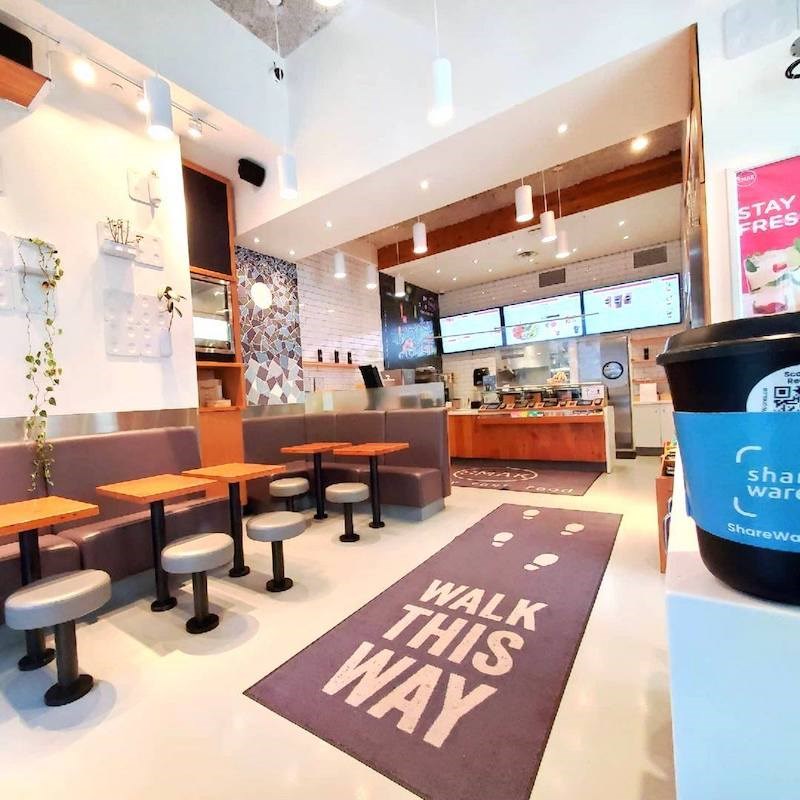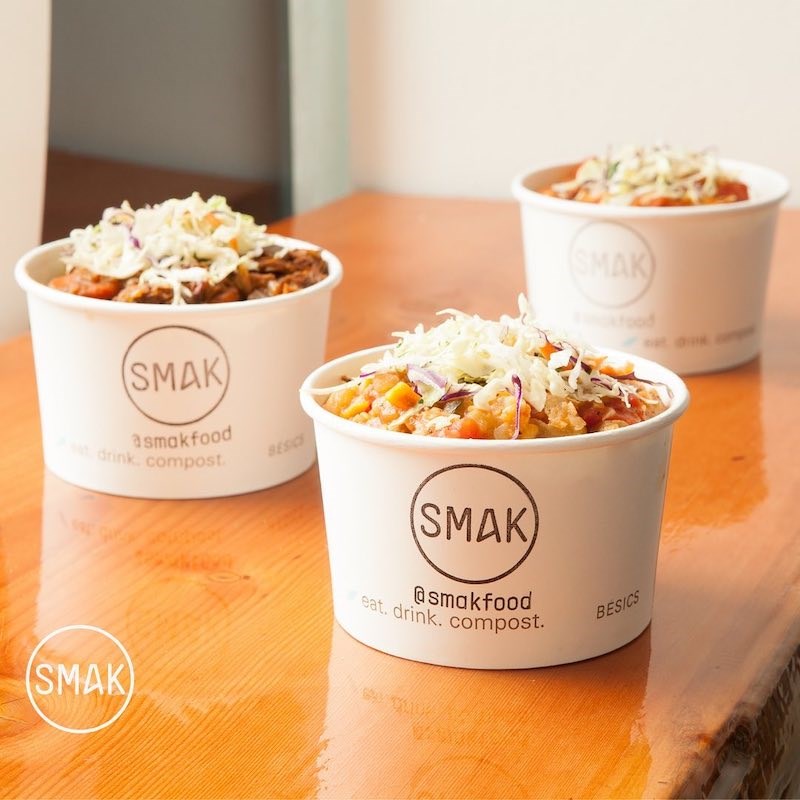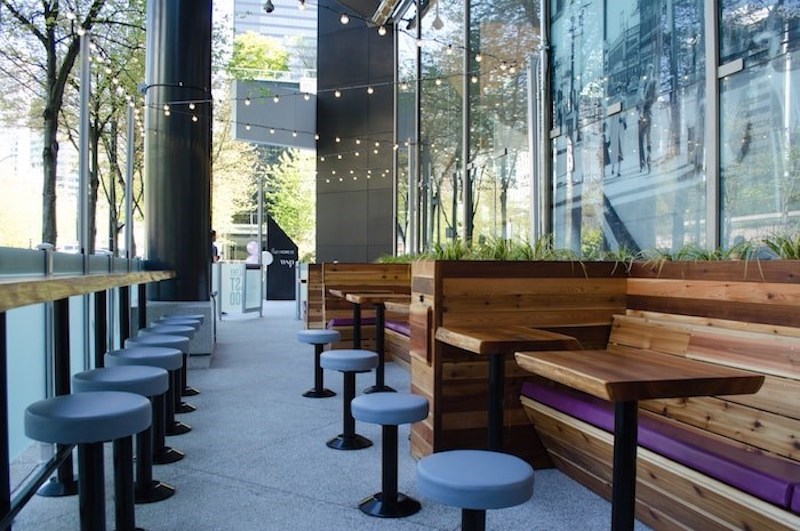An innovative local restaurant business focused on giving Vancouver office-dwellers healthy and sustainable on-the-go fare has shuttered all three of its locations, citing numerous reasons tied to the coronavirus pandemic and inaction by local leaders to address pressing issues in the city's core.
Smak, which operated three branches of its "healthy fast food" outposts — on Granville, Pender, and Howe streets — in the downtown area, ceased operations entirely on Friday, Oct. 8, owner Brendan Ladner tells Vancouver Is Awesome in a phone interview.
With a business model centred on quick-serve daytime eats for downtowners looking to get more nutrition out of their work-week breakfasts and lunches out, Ladner says the COVID-19 pandemic ultimately brought about the demise of Smak, which had been struggling for some time and relying on government subsidies to stay afloat.
Those subsidies, though, have many business owners like Ladner over the proverbial barrel. "We were happy the banks were giving us a six-month break on payments, but we realized we'd have to pay back a year and a half in payments to make up for it," he recalls.
"As a business owner, you plan for the day when you're finally paying off the banks — that day was likely to never come for Smak because of COVID," adds Ladner.
Even with what seemed like a reprieve on paying for Smak's three retail locations, the customer base was increasingly depleted due to the office worker exodus and shift to the work-from-home model.
Ladner says Smak's drop in customer levels mirrored the drop in people heading into downtown Vancouver to go to work daily. Though many businesses like Smak were optimistic there would be a wave of people returning in the fall, Ladner notes that September 2021 saw lower sales at Smak than September 2020.
"The foot traffic just isn't there," adds Ladner.

Further, those who are back in the office are often there only a couple of days a week, which complicates things for a business like Smak that served healthier foods. Ladner speaks to the customer mentality of "I deserve a treat" guiding choices when looking to dine out downtown; they are often in that part of Vancouver to attend an event or have an outing and aren't as concerned with balancing frequent indulgent meals out with a couple of healthy ones.
"I really see a shift in terms of customer preferences," observes Ladner. Even the office workers are seeking a healthier option about half as often, in proportion to how often they're physically in their office. "It makes it even more of a grind," says the restaurateur.
Losing customer loyalty to delivery apps
But customers are also increasingly seduced by the bargains, promos and freebies dangled before them by third-party delivery apps. The consequences for a business like Smak were multifold. Ladner says those ordering perks for customers were "deals that come at the expense of the operator," on top of already-gouging fees.
"Honestly, I don't understand how a mom-and-pop restaurant can really make a go of it when you're giving away 20 to 30 percent of every single sale to third-party apps," Ladner points out. Essentially, the business pays third parties to be on their platform, but the customer belongs to the app or service, not the restaurant. Mistakes on orders were the responsibility of the restaurant, as is the labour to tend to the often noisy ordering device.
"We would do a lot of work to make the app look good," adds Ladner.
Compounding the issue with third-party delivery apps is the rise in popularity of the "ghost kitchen" — a restaurant without a physical location, just a prep space in a commissary or shared kitchen. Ladner cites delivery apps like DoorDash, which have gotten into the ghost kitchen business, and who have the ability to rank those businesses higher in their app search results, sending more customers their way.
"How on earth can I, at downtown rent, compete with some dude in 400 square feet on Industrial Ave.?" asks Ladner. "I can't."
Not only is the virtual marketplace crowded, but the brick-and-mortar one is too. Ladner says downtown has seen an uptick in quick-serve model restaurants moving in, meaning increased competition for a dwindling supply of eaters.
"We were fighting with everybody else for pieces of a smaller pie."
Another sector taking a hit: while tourists were not Smak's bread and butter, without cruise ships docking in Vancouver, the hospitality industry workers who were Smak customers are not on the job, either.
'Why the hell would anybody go to downtown Vancouver right now?'
Besides downtown's office or hospitality workers, Ladner says it's become more and more unappealing for locals to spend time in the downtown core.
"Why the hell would anybody go to downtown Vancouver right now?" asks Ladner. An avid cyclist and a parent of two young children, the businessman says he doesn't feel safe cycling with his kids in the city despite the increase in bike lanes. In general, safety is an issue, he says.
Contributing to the lack of "locals coming [to downtown] for leisure," is, in part, so much open drug use, notes Ladner, describing the picnic table outside Smak's Pender Street outpost as a "crack table."
"I don't mean to criminalize mental health and poverty — it's a much bigger issue," he says, adding Smak has had to contend with rising vandalism, shootings, theft and threats against staff.
Staffing and supply woes piled up
Echoing others in the industry, Ladner says keeping and retaining staff has been an ongoing issue. Smak has long relied on the foreign worker visa program, which has been curbed. Student visas, meanwhile, only permit part-time work, which means to get a full week of work, Smak would need to find, hire, and train two people. As a result of staffing shortages, Smak's hours were cut.
Costs have gone up too, particularly packaging, which means all those take-out bowls came with a bigger price tag for the business; Ladner says those costs rose by 40 per cent for Smak. And despite offering completely compostable packaging, Ladner says producing those items comes with a massive footprint, which he had wanted to get away from.

Those "green" ethics have always been front-of-mind for Ladner, who is dissatisfied with the lack of real engagement by the City of Vancouver and entities like the Downtown Vancouver Business Improvement Association when it comes to seriously considering more car-free infrastructure.
Smak was "a very green business," and Ladner says he was "profoundly disappointed" by city council's "lack of conviction" to do anything about making the area more "inviting and hospitable," long before the pandemic began.
Those kinds of problems were "hindrances to more growth" for the business, but not preventing it, unlike the pandemic.
Rather than focus too much on the negatives of Smak's closure, Ladner calls out a few reasons to feel proud.
"Since Smak first opened on May 29, 2013, we served over 1.15 million customers, made over $13 million in sales, and I signed paycheques for over 350 people. We sold 128,000 full-size green curry chicken bowls," he adds. "That's a lot. That's a lot of dollars to local suppliers."
As a business that offered many customers a point of human connection during a busy workday, there is a profound loss to grieve, despite the fact that it may seem like other restaurants — namely those that, unlike Smak, serve booze, or what Ladner calls "alcohol and atmosphere" — are thriving. But even big brands like A&W and Starbucks have packed up from the neighbourhood, he points out.
Ladner needs to tie up the business ends associated with Smak's closure, but he's certain that he will likely work in the restaurant biz again.
"It's what I do, and what I'm good at," he tells Vancouver Is Awesome. "But I'll be going to work for someone else who has money. I'll go from being a job creator and innovator to being an employee."
In business, it comes down to finances — precisely as it did for Ladner, who sums up the Smak chapter's end: "Mostly at the end of the day, there's just no money on the table. The business model doesn't work."





